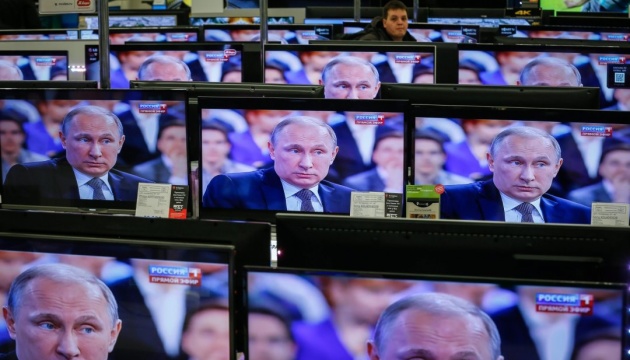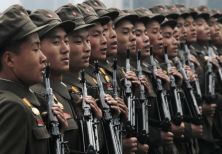By Vitaliy Syzov
The Russian media space has shaped the political reality that exists there, and after the change of Vladimir Putin’s regime, it should be reformed. Russian aggression against Ukraine has revived the imperial realities of the 19th century in Europe. We can say that imperialism is an integral part of Russian culture and Russians are doomed to endlessly reproduce it in one form or another.
The first empire was the empire of the Romanovs, although Russia began its expansion long before them, constantly including new lands. Russian traditional imperialism of the Russian rulers in the 20th century was replaced by communist imperialism for 70 years, in which the general secretaries of the communist party took the place of the tsars. After him, there were 25 years of energy neo-imperialism, which ended with the seizure of Crimea and the armed aggression in Donbas. The open invasion of Ukraine with an attempt to “denazify” it, and, in fact, de-Ukrainize it, opened the next imperial page in the history of Russia, the name and definition of which has yet to be given.
Such a craving for the revival of the imperial essence of the state can hardly be explained by mere chance, for this there must be prerequisites in the culture and psychology of people, as well as a number of other factors. The centralization of all spheres of life in the state, including the media, is one of the main reasons for the imperial renaissance.
Media centralization
Former Prime Minister of the Russian Federation Viktor Chernomyrdin said that the state company Gazprom is Russia’s backbone. Now we can rephrase it and say that federal television is the backbone of modern Russia. The television unites citizens of Russia, gives them a sense of belonging to some separate community. It forms a common reality for a resident of Vladivostok and a resident of Kaliningrad. These people, who are completely separated from each other, living in a completely different natural environment, economic and political environment, nevertheless perceive themselves as a single whole, existing in one reality, having common desires and problems.
The main Russian TV channels have long been state-owned de facto and existed on its direct or indirect subsidies. The All-Russian State Television and Radio Broadcasting Company (VGTRK) has a special place in this system.
“Industry-forming media holding number 1 in the country with a total coverage of 99% of the Russian population. The main source of information and cultural context in Russian. The undisputed leader in the production of audiovisual content in Russian in the world,” this is how the company describes itself on its website.
Federal news releases and federal political shows allow not only to control the political agenda of the country, but also to shape it. With such centralization of information flows, any government will be very tempted to use state media for its own purposes. True, this task was significantly complicated by the development of social networks, but this problem was solved with the help of a ban on a number of them by the Russian authorities.
Returning to the main topic – the de-imperialization of Russia should also include the de-imperialization of its media space. Such a huge country as Russia does not need unified news releases.
News without Moscow
Decentralization of social and political federal broadcasting should become the number 1 goal after the fall of Putin’s regime. The current media centralization creates a favorable environment for the strengthening of authoritarian power. Any power receiving such an instrument risks abusing it in its own interests. Examples of the use of public broadcasters in the interests of ruling parties and the current government are not uncommon for the European Union, with its deep democratic traditions. The Russian Federation does not have such traditions, so the threat of an authoritarian relapse is much higher there.
The central office of VGTRK can fully perform the function of a free information agency for subsidiary television and radio companies and any other regional players. The existing centralized system of regional broadcasters in the VGTRK system provides for the leadership of the Moscow editorial office and its priority in determining the direction of work and coverage.
Each subregion of Russia should have its own news release, where local editors will decide what will be broadcast. Federal television can retain entertainment projects. Real news should return to the screens of TV channels in the regions. The center should not broadcast only one correct line. If we leave everything as it is, the media will sooner or later create a new authoritarian reality, completely centralized. Other federal TV channels must stop receiving direct or indirect subsidies from the budget, become self-sustaining, or revise their structure and principles of work. Otherwise, the new Russian government will inevitably step on the rake of the old one and will not resist the temptation to subordinate itself and use central television.
A new system of state-federal public political broadcasting can be modeled after the German one, which was created as one of the elements of denazification. After all, Russia may face a similar process.
In Germany, tenders are held for the production of the federal news program on the ARD TV channel, and they are not produced in the capital – Berlin, but in Hamburg. Regional television companies should not be state-owned, they should be public, they must be supported by a regional tax. They, in turn, form the budget of federal television.
National languages
A mandatory point is a decolonization and national languages. The balance between them and the Russian language must be guaranteed. Dubbing and subtitling must be guaranteed in accordance with the requirements of national authorities.
The release of news should not be made in the capital, its timing and subject matter should be limited. Yekaterinburg, Novosibirsk or Tomsk can be alternative centers. Kazan, Nizhny Novgorod, St. Petersburg, Rostov-on-Don, Krasnoyarsk or even Sakha-Yakutia may be considered (Yugra TV).
Another variant of the reform will be the construction of a truly public broadcaster on the basis of VGTRK, following the models of Great Britain, Germany or even Ukraine. It is to be accountable to and controlled by society, and independent of the central government.
Now in Russia there is one customer for the video – and this is President Vladimir Putin. It is worth recalling that one of his first and most resonant decisions as president was the cleansing of the media space and the establishment of control over the main TV channels. Here lies the root of the problems of Russia and its society. Control over the main telebuttons of the country allows Russian propaganda to reach unprecedented heights in its effectiveness inside the country. Despite the obvious failure of Russian policy on all fronts, drawing Russia and its society into a senseless war, and economic stagnation, no mass protests are visible. Citizens, in general, even if they do not agree with the policy of their country, silently accept it and are not ready to protest. The apparatus of state violence and the state apparatus of brainwashing do their work in sync, and this unity needs to be destroyed.













